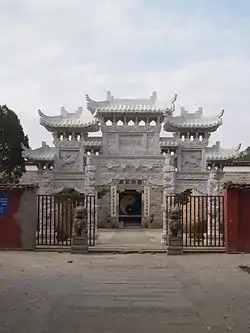| Longhu Shan | |
|---|---|
 Mount Longhu | |
| Highest point | |
| Elevation | 150 m (490 ft) |
| Coordinates | 28°6′49″N 116°57′30″E / 28.11361°N 116.95833°E |
| Geography | |
| Location | Jiangxi, China |
| Part of a series on |
| Taoism |
|---|
 |
Mount Longhu (Chinese: 龙虎山; pinyin: Lónghŭ Shān; lit. 'Dragon Tiger Mountain', Gan: Lung-fu San) is located in Yingtan, Jiangxi, China. It is famous for being one of the birthplaces of Taoism, with many Taoist temples built upon the mountainside. It is particularly important to the Zhengyi Dao as the Shangqing Temple and the Mansion of the Taoist Master (天师府) are located here.[1] It is also known as one of the Four Sacred Mountains of Taoism.
Two notable Taoist temples on Mount Longhu are the temples of Immortal City (仙岩) and Zheng Yi (正一), both founded by Zhang Daoling (张道陵), the Han Dynasty founder of the religion. There are more Taoist temples in nearby Shangqing (上清), one of which is mentioned in the beginning of the famous Chinese famous traditional novel Outlaws of the Marsh (水滸傳).
Mount Longhu also has cultural significance as a historical burial site of the Guyue people, who placed the deceased in hanging coffins on the mountains cliff faces.[2]
In August 2010 UNESCO inscribed Mount Longhu on the World Heritage List as part of the complex of six sites that make up the China Danxia.[3]
Mount Longhu can be reached from the nearby city of Yingtan.
Gallery
 A cliff-side Taoist temple
A cliff-side Taoist temple The Tianshifu Gate of the Celestial Master Temple at Mount Longhu
The Tianshifu Gate of the Celestial Master Temple at Mount Longhu View of the mountain's cliff
View of the mountain's cliff Close-up of the cliff
Close-up of the cliff
See also
References
- ↑ Mt Longhu home of the mansion of taoist master Archived 2008-05-18 at the Wayback Machine
- ↑ Hanging Coffins in Longhushan (Dragon-Tiger Mountain) Archived 2009-03-18 at the Wayback Machine
- ↑ "China Danxia". UNESCO World Heritage Centre. Retrieved 2021-03-15.